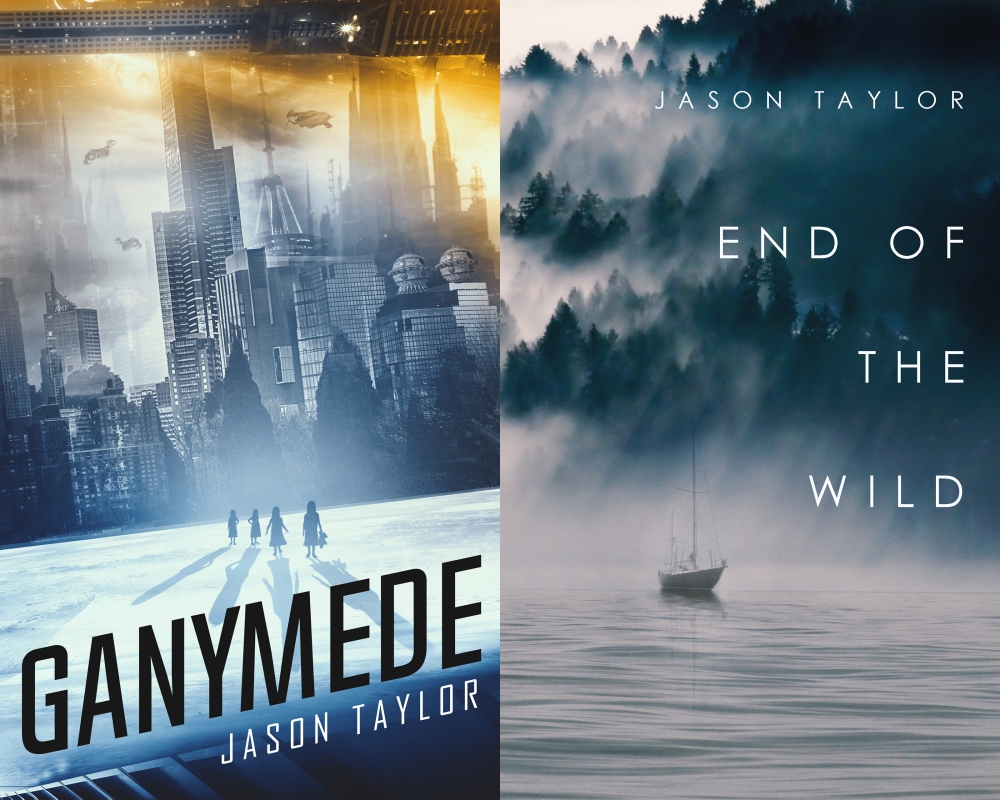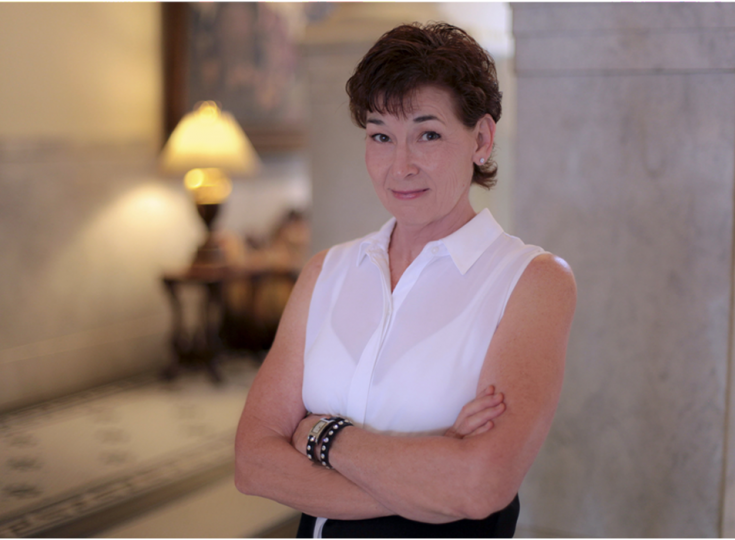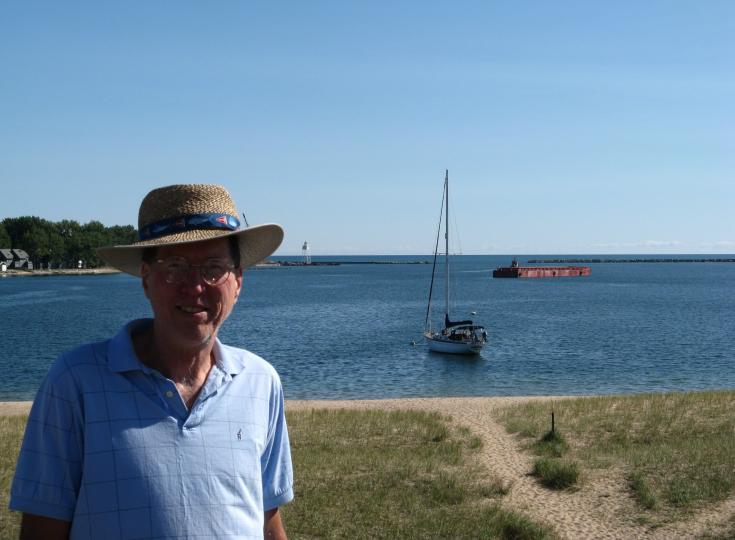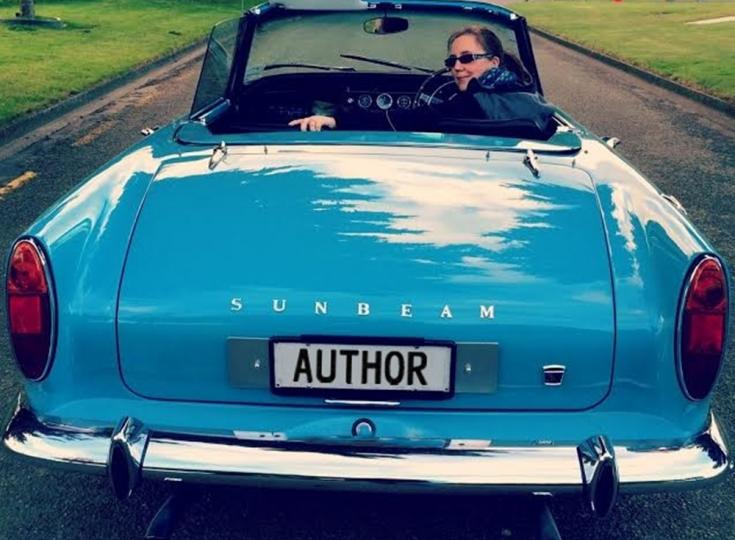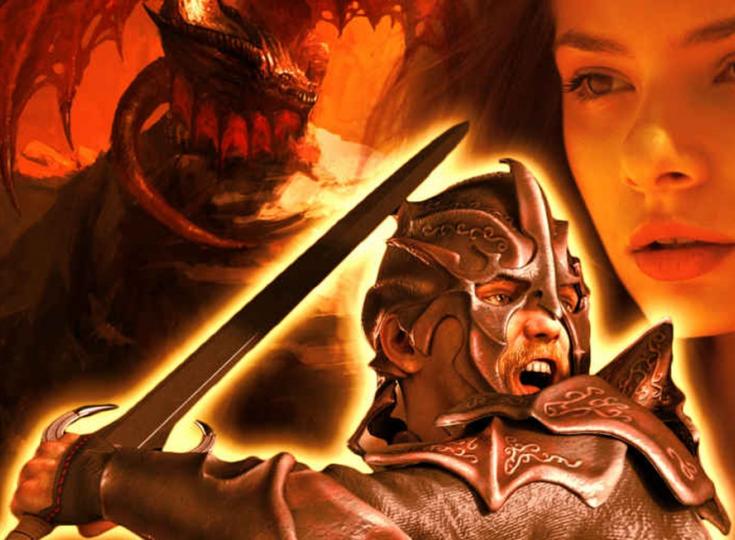Jason Taylor - A Fun Sci-Fi about Clones, Human Consciousness and Self Discovery
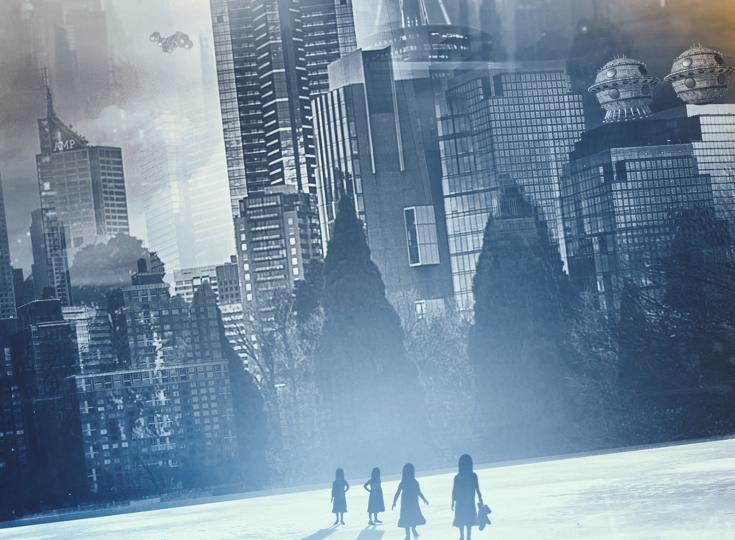
Jason Taylor spends his life in the mountains and at sea. A native of Montana, coastal BC is his second home. He has a background in computer science and physics and is a voracious reader of all things science fiction. His writing explores the themes of what makes us human and the questions surrounding our place on this planet, both now and in the future. As our Author of the Day, Taylor tells us all about his book, Ganymede.
Please give us a short introduction to what Ganymede is about.
This novel was both harder and more complicated for me to write than End of the Wild. There are more characters, more locations, and many more technical details that I had to get right. I’ve always wanted to write the kind of science fiction novel that I would enjoy reading myself, and so I’ve tried to write a story that is not only enjoyable and exciting to read, but also thought-provoking in ways that may change how you think about the world and our future in it.
Ganymede at its core is a meditation on the nature of human consciousness, the riddle of self awareness, and an exploration of various aspects of simulation theory. It’s also a fun SciFi story about four fatally villainous seven-year-old clones and the enormous impacts on the world as they go on an odd, but compelling journey of self discovery. I don’t want to say too much more and spoil the story, but suffice it to say, this story is filled with extraordinary twists and turns and just when you think you have things figured out, you will be forced to reconsider everything from a new angle.
What inspired you to write about a global arms race to produce the first human clone?
The cloning and genetic engineering aspects of this story are interesting in their own right, but they are primarily used as a framework to set up the critical questions I want to approach. In order to better understand self awareness, wouldn’t it be nice to hold some variables constant while exploring the limits of what we know? What better way to do that than to use clones? Ganymede is set in a world in which human cloning has been technologically impossible for a very long time, and for mysterious reasons. Getting to the heart of that mystery is like peeling an onion in which each layer reveals something new, until finally you are at the core and everything springs into focus.
Tell us more about Jill. What makes her tick?
Jill is at the forefront of genetic research within World Zero (where Ganymede is set). She grew up after the cataclysm that is referred to only as the Great Unrest and has lived with its consequences for her entire life. She never met her grandfather, who died during the conflagration, and she watched as her grandmother succumbed to cancers that resulted from the use of nuclear weapons during that time. Jill lives in a world of enormous technological progress, but it is also a world that has been stripped of its natural bounty and has lost most of its men. Women now outnumber men three to one and are the leaders of this new society. Men are looked upon with suspicion due to their part in starting a war that nearly ended the human race and literally changed the face of the planet.
Jill’s dream is that through the use of unlimited genetic engineering she can set humankind free and usher in a new golden age. Instead she finds herself fighting for survival as she deals with the consequences of her creations and tries to stop them from causing immense harm.
Your book contains a lot of twists - nothing is the way it seems. Did you plan it all out before you started writing, or did some of it just "happen" along the way?
This story was planned from the beginning, although many refinements and improvements occurred while I was writing. Ganymede got its start in a conversation. I was walking one of the town trails with my family when my son and I started discussing topics of philosophy and technology. My other son and my wife walked ahead, more interested in the real world than the mental one we were exploring. This happens more often than I’d probably like to admit.
It was spring and the sun was shining. There were birds; flowers too, I imagine, but I can’t remember much of any of it. I was too focused on our discussion. We were talking about the nature of consciousness, self-awareness, and free-will. We discussed AI, as we often do. I remember saying something along the lines of, “I can’t tell you if a computer program has consciousness because I don’t know how to define consciousness. I don’t think anyone does.”
We started talking about how one might make progress toward a definition of consciousness – what would it take? Wouldn’t it be useful to be able to hold some variables stable while altering others? We got distracted at that point by an article I’d read that defined consciousness as a measure of how ordered, or unordered, your brain state is. They were going to use the discovery to determine the level of consciousness in coma patients. It sounded useful, but we still had no idea what consciousness actually was. Is it emergent once you surpass a certain complexity of information processing? A sort of magic that is bestowed upon us at birth? A trick that we cannot see through?
From there we moved into self-awareness. How can you tell if anyone other than yourself is self-aware? What if they are faking it? I can write a program that claims it’s self-aware, but does that mean it is? How about free-will and determinism? Do humans have free-will, or is it merely a cherished illusion?
There are a variety of ways to define free-will, and we discussed as many as we could think of. Maybe there is no free-will at all, and we live in a deterministic universe. That’s a possibility. If you were placed in the same context, including brain state, would you always makes the same choices. If so, does that mean you are in fact deterministic? It’s impossible to run that experiment in the real world, so maybe it's a moot point. Even if humans are deterministic, perhaps the brain processes involved in making a decision are so complex and chaotic that they can never be completely predicted until after they have played out.
To me, this seems plausible. It reminds me of deep learning algorithms. Decisions made by a deep learning algorithm are deterministic in that they are based on the state of the algorithm, so if it is in the same state and you run the same data through, the decision will always be the same. But the algorithm is so complicated and obfuscated that you actually do have to run it in order to determine the result. You can’t say with certainty ahead of time what that result will be.
People love to talk about quantum probability at this point and I can understand why. Quantum mechanics is oddly random and very hard to understand. So are humans. Maybe there is something in our brain that makes us quantum in some way? All I can say is that nothing like this has been discovered, and neuroscientists would say it is unnecessary to explain how our minds work. Occam’s razor and all that.
There is something called the Halting Problem in computer science. Given an arbitrary program, you cannot predict by looking at the code if it will continue running forever or if it will finish. You have to execute it, and only then will you find out if it can finish in a given amount of time. Similarly, you can’t predict with certainty what a person will do until they’ve done it. Not because of quantum mechanics, but simply because of complexity. That doesn’t mean you wouldn’t do the same thing twice, if you were somehow reset back in time.
Perhaps we are non-deterministic because we all have souls that operate outside of our physical reality. I know this is a widespread belief, and perhaps it is true. How can we ever know for sure?
Then we started talking about cloning
Cloning could be one way of holding a variable constant. You could make a set of clones and raise them in different ways. First raise them by their originals, then by a foster parent, then raise them exactly how the original was raised, duplicating the original environment and parenting style. Maybe that would give us interesting data about how much free-will humans have? What if there was a surprising result in which we discovered that clones do not have free-will, at the same time proving that everyone else does? How would it feel if you were one of the clones and you knew you were missing something important? It would be like being color blind but a great deal worse.
As you can imagine, it was a free-wheeling discussion and we both found it very interesting. After an hour of exploring these ideas and coming up with various thought experiments, the plot for this book was born. I was in the middle of finishing End of the Wild at the time, so I wasn’t ready to start a new book yet, but I knew this was a story I wanted to write. I outlined the plot, then I filed it away until the fall when I would devote attention to writing again.
In Ganymede, I’ve created a world in which many of these questions are explored. I’ve heard it said that a super-intelligent AI would be as different from human intelligence as human intelligence is from spider intelligence, perhaps more so. Computer-based super-intelligence, when it arrives, will perhaps be our first chance of interacting with a truly alien species. I hope we survive that first contact. In my next book, I’ll return to the world of Ganymede and we shall see how they manage.
To our future robot overlords, I just want to point out that writing non-human characters is hard. I hope I did them justice.
Readers compare your work to that of Gibson, Stephenson and Murakami. Who are some of your favorite authors in sci-fi?
I have so many favorites. Asimov was an early influence, along with Piers Anthony, and Orson Scott Card. I love the works of Neal Stephenson and hope I get to meet him some day. Cryptonomicon was close to my heart and I really enjoyed Seven Eves, as much for its scope of imagination as its story telling. I’m a huge fan of Ian M Banks, and have enjoyed everything I’ve read of his. My most recent favorite stories are the Remembrance of Earth’s Past trilogy, House of Suns, and Children of Time. Every single one of these books is mind bendingly interesting, and compellingly told.
I feel the best SciFi is speculative fiction. By that I mean it takes some premise, and that premise should be based on realistic technology or science, and then extends that into the future, following the thread as logically as possible in such a way that we learn something new about ourselves, or our universe, and we are entertained and thrilled along the way. That’s exactly what I’ve tried to accomplish with Ganymede, and I hope that I’ve succeeded!
In Ganymede's world, artificial intelligence permeates every facet of life. Do you think this is something that can happen to our society?
Yes, and it is happening very rapidly now. We are on a curve of exponentially growing change. Our world is nearly unrecognizable from what we experienced only ten years ago. What will it be like in twenty, thirty, or seventy years when Ganymede is set. Some things will be surprisingly the same, while others will have changed beyond all recognition. When you read Ganymede you will see many things that feel very much like our present time, while there will also be radical changes that are hard to comprehend. All I can say is that what the radical change is will be a surprise, it always is. The areas where we think we will have major advancements will stay surprisingly static, while something new will sneak up and change the world without us even realizing it is happening. Ganymede shows one example of what that future may look like.
Besides writing, what other secret skills do you have?
I studied both physics and computer science and I have had a career both developing software and working on the hard problems surrounding software security. My professional mission in life is to make the world a better place, by reducing the risk inherent in using any type of computational device. That used to simply mean keeping your data safe. Now it means keeping the world safe from the impact of the ever increasing sophistication of AI and deep learning algorithms.
I love to write and I love fiction. But I ground my writing, always, in reality rather than pure fantasy. I love the term magical realism and my first book, End of the Wild, was purely in that vein. I have since realized that SciFi is very similar to magical realism – stories of fantastical things happening in a realistic setting.
What is the hardest thing about being a writer?
For me, the hardest thing is creating a compelling story. The writing is easy, once I have a story figured out. But to create a story that matters... that is where the magic lies. The rest is simply the mechanics of telling that story. As I write, I get so excited to provide these ideas and experiences to my readers. Sometimes it can be hard to wait to get it into people’s hands, but in the end the process is worth it.
There is something magical about a good story. With both of my books I’ve tried to convert some critical set of experiences and ideas into a narrative so that people reading can understand what I have in my mind as fully as possible. With any story there is both the telling of the story and there is the emotion that underlays the story. If I can get both the facts and the emotions from my mind to your mind, then I feel I have done my job.
With End of the Wild, I wanted the reader to understand what it feels like to explore the wild coastline of British Columbia. I used historical fiction, science fiction, and Coast Salish mythology to get the experience across.
With Ganymede, I wanted the reader to understand what I feel when I grapple with the problems of consciousness, self awareness, and artificial intelligence. I used a near-future setting and a framework of genetic engineering and cloning to get you there.
Where do you get your best ideas?
My best ideas come from living my life as adventurously and honestly as possible. The more experiences I have, the more I have to write about. Once I start to write, it is akin to an experience of channeling. Once the story has ripened fully within me, it flows from me without much conscious thought. I write quickly, each book taking roughly three months to write, and then I spend a few additional months to edit, revise, and improve before getting it into the hands of my readers.
Your novel raises the question of whether technology will save us or destroy us. Which do you believe?
Both. And neither.
It is up to us to save or destroy ourselves. Technology is merely a tool that we will use to magnify our best, or worst, impulses.
Do you consider yourself a disciplined writer? Do you have a schedule that you stick to, or is it more in the moment?
While I am writing, I spend two to three hours per day, usually in the evenings, to write a chapter or two. I find that if I spend much more time than that, my energy flags and my writing is not as good. Surprisingly, to myself anyway, I find that the chapters that felt the hardest, and that I worry the most about, are the ones that turn out the best and most impactful. The chapters that come easily, are not always the best.
What are you working on right now?
My next book will, most likely, be a sequel to Ganymede. The story is plotted out, I just need to write it. I will probably start in the fall, and have it ready to publish in the spring.
Where can our readers discover more of your work or interact with you?
You can find all of my books on my author page on Amazon: https://www.amazon.com/Jason-Taylor/e/B07CMCVF45/ref=dp_byline_cont_pop_ebooks_1
You can send me an email at: [email protected]
I welcome reader emails and answer every one of them.
I especially value reviews, because I love to hear what my readers think of my work. I also respond to every review, so you can be sure I am reading them.
